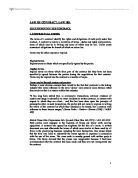In deciding this issue, the general rule is to be taken into account as stated in Pinnel’s case and Foakes v Beer whereby the part payment of $1 is not considered to be full satisfaction of the $10 rental. This would in effect mean that Kajai is still liable to pay the balance of $9 because he has not provided consideration for the promise made by Long. Furthermore, under Foakes v Beer, it can be stated that if Kajai is under an existing obligation to pay a larger amount, he cannot at law discharge that liability by paying a smaller amount. Thus, applying the general rule, Kajai cannot have been said to have provided consideration for the discharge of the $10 rental per week which will enable Long to claim prima facie, all the ‘arrears’ between January to September. A point to note is that the exception under Sibree v Tripp does not apply here as there was no request for payment at an earlier date than required which would disable Long’s claim.
However, in advising Long, one must consider the possibility of Kajai invoking the defence of the promissory estoppel to estop Long from going back on his word (promise).
This doctrine is an equitable doctrine which arose due to harshness of the common law rule in part payment where a party relies on the other’s promise of receiving only part payment as full satisfaction of the whole amount. It has now become the only true exception to the doctrine of consideration.
The case of Central London Property Trust Ltd v High Trees House, obiter by Lord Denning stated that promissory estoppel is invoked where one person (A) makes to another (B) a clear and unambiguous representation of fact intending that the other (B) act upon it, if the representation turns out to be untrue, and if that other (B) does act upon it to his prejudice, the representor (A) is prevented or estopped from denying its truth. Eventhough this doctrine has been subjected to mush criticisms, it has been recognized and appreciated in the later decisions like Minister of Pension v Robertson, Ajayi v Briscoe and Argy Trading v Lapid Trading.
The law has now been established that in order for there to be this defence made available, few elements or conditions have to be satisfied.
The law says that the promise must be unequivocal and clear (Woodhouse v Israel Cocoa v Nigerian Produce Marketing). On the facts given, Long did make a promise to Kajai on the $1 rental after Kajai requested it and one may say that it is made unequivocally, as long as Long’s promise was made due to the conditions that Kajai suffered loss of business for the first three months and because of this he was on the verge of bankruptcy later. This shows the seriousness of intention when the promise was made. It is because of Long’s promise that Kajai paid $1 per week instead of $10. Thus a clear and unequivocal promise have been made by Long.
In order for the defence to be in favour of Kajai, there has to be a contractual or any other legal relationship as required by Ajayi v Briscoe and the case of Durham Fancy Goods v Michael Jackson Fancy Goods where Lord Donaldson stated that an existing contractual relationship was not necessary providing there was a pre existing legal relationship which could give rise to rights and liabilities. Applying this to the facts of the question, it seems that this requirement is satisfied, as Kajai and Long already have a business relationship with regards to the rental of the washing machine and due to this pre existing contractual relationship there was some reliance on the part of Kajai for Long’s promise.
Another further feature of the doctrine is that it only operates as a shield (defensive) and cannot be a cause of action for enforcing the promise by itself as was clearly stated in Combe v Combe. All that the doctrine will do is to prevent Long form acting inconsistently with his promise. Since Long may sue Kajai, It can be established from the facts that Kajai is only seeking to rely on this defence as a shield. This was affirmed in Argy Trading v Lapid development.
As the doctrine of promissory estoppel has its roots in equity, equitable principles apply to the effect that ‘he who comes to equity must come in clean hands’ as stated in D&C Builders v Rees. The question now is whether Kajai is coming to equity with clean hands? The are two possible interpretations that can be drawn from the facts given. If Kajai requested for the promise to be extended for the next 6 months on the sole purpose that he was on the verge of bankruptcy, then its submitted to the court that he came to equity with clean hands, as he make full and frank disclosure of his financial position when Kajai requested for 6 months extension. (Adams v R Hanna & Sons Ltd).
However, if the reason given by Kajai was an inducement that he actually needed the money for redecorating the shop and instead he gave the reason that he was at the verge of bankruptcy, then its submitted to the court that Kajai has practiced fraud on Long top obtain his promise. This construction is only possible if the courts has enough evidence to find that Kajai was actually lying on the facts that he was at the verge of bankruptcy.
Another element to satisfy is whether Kajai have acted on the promise or altered his position in reliance to it, in order to invoke the doctrine as demonstrated in High Trees itself and Tool Metal Manufacturing v Tungsten Electric Co. A further question is whether Kajai must have acted to his detriment. The law in this area is unsettled because there are various views that has been forwarded by the courts. If the court refers to the case of Goldworthy v Brickell, the Kajai must suffer a detriment. On the contrary, if the courts were to follow the case of WJ Alan v El Nasr Import & Export, Kajai need not suffer a detriment but rather he accrues a benefit. Its argued that if detriment is required, detriment itself as shown by Tanner v Tanner amounts actually to consideration for the promise that was made. Therefore, its illogical that detriment should be required.
The extraction of facts given shows that its quite impossible to decide what is the status of Kajai. Arguably, applying the decision of Ajayi v Briscoe if it can be shown that Kajai has relied on the promise and altered his position, as with Long’s promise he may have hoped that money saved from paying only $1 would help reduce his financial difficulty.
Finally, one should consider whether this defence which is available to Kajai is suspensory in nature or is it existinctive. Looking at the facts of this case, for the duration of January to March, Kajai did come to equity with clean hands and therefore its submitted that the estoppel is extinctive. Considering the duration between March to June, if Kajai actually came to equity with clean hands its submitted that this doctrine is extinctive too,which will disable Long to claim for the $9 per week.
Finally, for the duration of Jun to September, it can be established from the facts that Kajai is now in a better position as he is making handsome profits due to the closing down of a rival's business. Therefore, applying the case of Ajayi v Briscoe and Tool Manufacturing v Tungsten Electric, Long’s rights is only suspended. This would allow him to resume the full payment of $10 per week from June onwards upon giving Kajai reasonable notice that he intends to resume his strict rights, though the 6 months period has not ended. This is only fair and just, since the doctrine itself is a creature of equity. Furthermore, Long now is in financial difficulties and requires finance.
In conclusion, since there is a conflict between common law’s part payment rule and the equitable principle of promissory estoppel, Long is advised that from the period of January to June his rights to claim the balance $9 is extinguised, as equity prevails over the common law when a conflict arises. This would only be possible if promissory estoppel is made out. However, the resumption of full payment from June onwards will be available to Long after giving reasonable notice.







